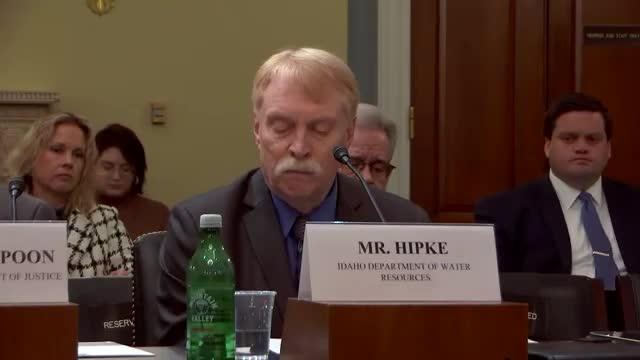Idaho officials urge clarifying Aquifer Recharge Flexibility Act after BLM interpretation delays recharge projects
Get AI-powered insights, summaries, and transcripts
Subscribe
Summary
Idaho water officials told the House Natural Resources subcommittee that a BLM interpretation of the Aquifer Recharge Flexibility Act is forcing new rights-of-way for third-party recharge projects and slowing efforts to recharge the Eastern Snake Plain Aquifer.
The subcommittee considered HR 331, a bill to amend the Aquifer Recharge Flexibility Act to clarify third-party use of existing Bureau of Land Management rights-of-way for managed aquifer recharge.
Wesley Hippke, water project section manager for the Idaho Department of Water Resources, testified on behalf of the Idaho Water Resource Board and described the Eastern Snake Plain Aquifer (ESPA) as a critical resource underpinning about 1,000,000 acres of irrigated farmland and municipal supplies. "This aquifer covers an area roughly the size of Lake Erie," he said, and the region produces more than $10,000,000,000 in goods and services annually.
Hippke said Idaho has invested heavily in recharge infrastructure but that a BLM interpretation requiring new rights-of-way for third-party use of existing canals is constraining the state's managed recharge program and could cause significant delay. "Despite the plain wording of the act, the BLM has taken the position that the act does not apply to third parties, only to the right of way owners of record," Hippke testified. "The BLM right of way process can be onerous and will add significant time to the development of recharge projects. This could severely delay the board's ability to reach the goals of recovering and stabilizing the ESPA."
Hippke told the committee that since 2019 the Idaho legislature has appropriated more than $500,000,000 to the Water Resource Board for water management improvements and that Idaho has spent approximately $60,000,000 on recharge infrastructure to date; the proposed amendment would, he said, let the board more efficiently implement managed recharge using canals with existing BLM rights-of-way.
Committee members questioned how long new easement processes take in practice; Hippke said securing a new easement has taken on the order of two years and that failure to use wet-year flows for recharge when available could mean lost opportunities to recover the aquifer. The hearing produced no formal action; members requested additional information in writing.
Ending: Sponsors said they would work with BLM and stakeholders to correct the interpretation so existing irrigation infrastructure crossing federal lands can be used for recharge projects without repetitive right-of-way applications.
